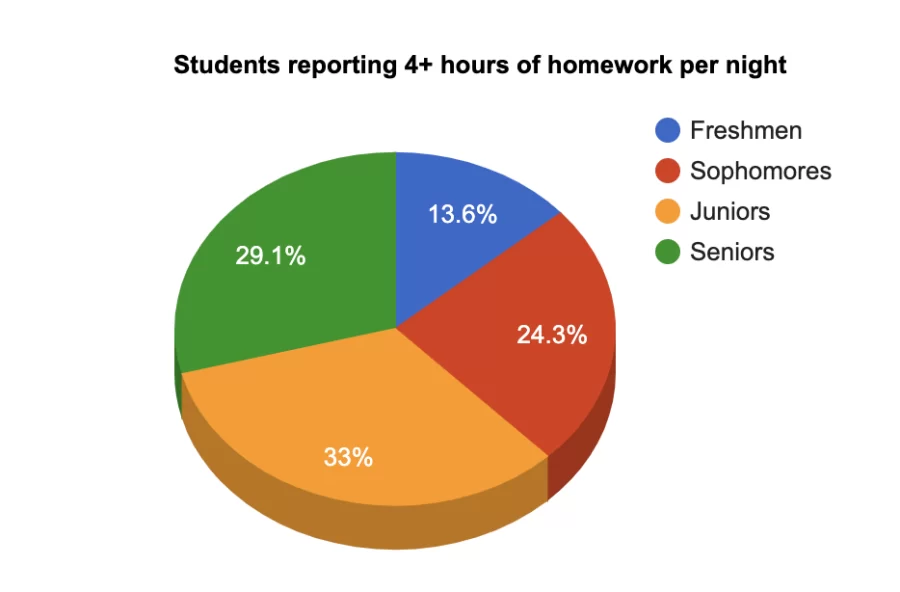Mental health survey results push administration to make changes
While the COVID-19 pandemic brought new stressors regarding public health, safety and isolation, little could have prepared everyone for the difficulties that the return to normalcy would also bring. In November and early December, WHS sent out a set of surveys to the students, parents and staff regarding mental health and stress.
According to Director of Counseling Maureen Mazzarese, “As we return[ed] to school, [the counseling department] really wanted to try to gauge how that experience was for kids in terms of feeling comfortable with COVID-19 precautions and stepping back into still wearing masks for a full day and what that felt like after a year of a very, very different schedule.”
Roughly half of the students at WHS answered the survey, which asked questions regarding the total number of hours spent on work outside of class, sleep schedules and reconnecting with peers. Sending surveys out to parents, teachers and students aimed to identify whether the WHS extended community was on the same page regarding student mental health.
Mazzarese added, “There was not much disparity [between the different target survey audiences], but rather a good deal of agreement that it’s been a welcome challenge to rebuild life in the classroom and try to work to bring that community back.”
Teachers have become more mindful of the potential obstacles that returning to full-time school may be having on students of all ages, grade levels and course rigors. Principal Mary Asfendis said, “There are teachers who have described that they’ve really cut back on the [amount] of information [they’re teaching in class] or are taking a slower pace…Knowing that students last year had a different school experience, there may be some reteaching that needs to happen because of the way things were approached last year.”
In the staff survey, 61.8 percent of teachers reported that they have modified curriculum compared to previous years and 59.8 percent reported that they have modified the quantity of work provided to students. With that being said, 42.9 percent of students reported spending four or more hours on homework per day, and these numbers increase when looking specifically at upperclassmen.
Mazzarese said, “I think one of the ones that really did stand out is the reported number of hours of homework by the students as compared to what the teachers think the homework should be taking. That same information, in terms of studying and preparing also has had some impact on the [midterm] exams. Administration, with the support of the teachers, is modifying the exam to make it feel maybe more manageable and less daunting.”
According to the WHS Student Handbook, homework assignments for major subjects should not exceed 45 minutes per class daily. The discrepancy has led to several discussions within staff meetings about how to reduce the workload moving forward.
“There’s ways to reduce the homework hours by working with the teachers; there’s ways to reduce the homework load by reducing the schedule. If you have six academic subjects, that’s a lot of homework. We can do three things: teachers can look at the homework and decide whether they can trim it down a little bit, students can adjust their schedule or we can work with students to better their study habits,” Mazzarese said.
Along with the course load, 45 percent of students report spending three or more hours on afterschool activities, which could be leading to a severe lack of sleep. According to the survey, only 16.7 percent of students reported getting the recommended eight or more hours of sleep.
Mazzarese said, “I’m very disturbed by the sleep numbers. The cumulative effect of not enough sleep is probably a large factor in the range of feelings that people are experiencing. Again, I don’t know how to fix it if we all want to continue to do the same things we always do.”
Asfendis commented, “It’s good to have these conversations while scheduling for next year is on the horizon. As you look at how to balance yourself as a student, you’re going to be in athletics, you may take on a job. Does that impact the course selections you take?” Working alongside teachers and staff at WHS, Mazzarese and Asfendis are continuing to look for ways to improve mental health and reduce the stress on students.
Starting with reducing the length of midterm exams, administration hopes to continue implementing new strategies and methods that will make the remainder of the school year, as well as future years to come, less stressful for all students.

